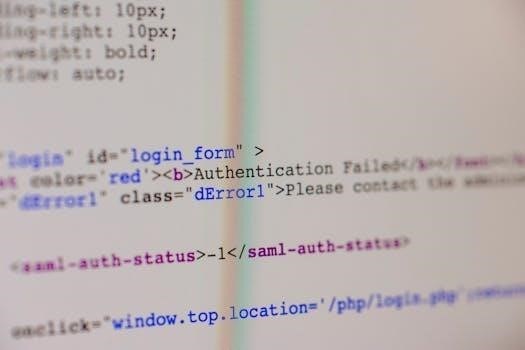Title⁚ Understanding and Avoiding Inappropriate Online Content

Understanding and Avoiding Inappropriate Online Content
Navigating the internet safely requires awareness. This guide helps understand and avoid harmful content, promoting a positive online experience. Learn to protect yourself and others from inappropriate material and foster responsible digital citizenship.
The internet, a vast repository of information and connection, unfortunately also harbors harmful content. This includes material that is sexually explicit, violent, hateful, or promotes illegal activities. The pervasive nature of the internet means that such content is easily accessible, posing a significant challenge for individuals and society as a whole.
Harmful online content can take many forms, including text, images, videos, and interactive media. It can be found on websites, social media platforms, online forums, and even within seemingly innocuous applications. The anonymity afforded by the internet can embolden individuals to create and disseminate harmful content without fear of immediate repercussions.
One particularly concerning area is the proliferation of sexually explicit and degrading content, especially that which targets or exploits minors. This type of content can have devastating consequences for victims and contribute to a culture of sexual violence and objectification. It is crucial to understand the different forms of harmful online content and the risks they pose in order to effectively protect ourselves and others.
Addressing the problem of harmful online content requires a multi-faceted approach involving individuals, families, educators, technology companies, and law enforcement agencies. By working together, we can create a safer and more responsible online environment for everyone.
Defining “Jerk Off Instructions” and Related Content
“Jerk Off Instructions” (JOI) refers to a type of explicit content designed to provide detailed, often degrading, directions for masturbation. This content typically takes the form of text, images, or videos, and aims to create a specific and often exploitative or coercive experience for the viewer.
JOI content often includes explicit language, suggestive imagery, and demands compliance from the viewer. It frequently incorporates elements of dominance and submission, using power dynamics to create a sense of control and manipulation. The content may be personalized, addressing the viewer directly and instructing them on specific actions to perform.
Related content includes similar forms of explicit material that aim to control or influence sexual behavior. This can encompass tutorials, guides, and scripted scenarios designed to elicit arousal and direct sexual activity. Such content often blurs the lines between fantasy and reality, potentially leading to harmful perceptions of sex and relationships.
It is important to recognize that the production and consumption of JOI content can raise serious ethical concerns, particularly when it involves non-consenting individuals, minors, or promotes harmful sexual practices. Understanding the nature and purpose of this type of content is crucial in addressing its potential negative impacts and promoting safer online behavior.
Ethical and Legal Considerations
The creation and distribution of “Jerk Off Instructions” (JOI) and related content raise significant ethical and legal concerns. Ethically, the exploitative nature of JOI, particularly its focus on dominance and control, can be seen as harmful and degrading. The potential for coercion and the objectification of individuals involved in the production of such content are major ethical red flags.
Legally, the legality of JOI content often hinges on issues of consent, age, and the presence of illegal activities such as child exploitation; If the content involves minors or non-consenting adults, it is unequivocally illegal and subject to prosecution. Even when all parties are consenting adults, the production and distribution of explicit content may be subject to local laws and regulations regarding obscenity and indecency.
Furthermore, the dissemination of JOI content can contribute to a culture of sexual harassment and violence; The normalization of dominance and control in sexual contexts can desensitize individuals to the importance of consent and healthy relationships. Platforms that host such content may face legal liability for failing to adequately moderate and prevent the spread of harmful material.
Therefore, it is crucial to consider the ethical and legal implications of creating, sharing, or consuming JOI content. Respect for individual autonomy, adherence to consent, and compliance with relevant laws are paramount in navigating the complex landscape of online sexual expression.
The Impact on Minors and Vulnerable Individuals
Exposure to “Jerk Off Instructions” (JOI) and similar explicit content can have a particularly detrimental impact on minors and vulnerable individuals. Minors, due to their developmental stage and limited understanding of healthy sexuality, are especially susceptible to the harmful effects of such material. The distorted and often exploitative nature of JOI can contribute to unrealistic expectations about sex, relationships, and consent.
Vulnerable individuals, including those with mental health issues, learning disabilities, or a history of trauma, may also be disproportionately affected by JOI content. The power dynamics and themes of control often present in JOI can be triggering or re-traumatizing for individuals who have experienced abuse or exploitation. The lack of context and the potential for misinterpretation can further exacerbate these negative effects.
Moreover, the accessibility of JOI content online makes it difficult to shield minors and vulnerable individuals from exposure. The anonymity and lack of regulation on many platforms allow for the widespread dissemination of harmful material, often without adequate safeguards or age verification measures.
It is essential to prioritize the protection of minors and vulnerable individuals from the potential harms of JOI and related content. This requires a multi-faceted approach, including parental education, responsible platform moderation, and the development of resources to support those who may be negatively impacted by such material. Promoting healthy sexuality and fostering critical thinking skills are also crucial in mitigating the risks associated with online exposure to inappropriate content.

Platforms’ Responsibility in Moderation
Online platforms bear a significant responsibility in moderating content and preventing the spread of harmful material, including “Jerk Off Instructions” (JOI) scripts and related content. This responsibility stems from their role as gatekeepers of information and their influence on users’ online experiences. Platforms must actively implement and enforce content moderation policies that prohibit the dissemination of illegal, exploitative, or harmful content.
Effective moderation requires a combination of automated tools and human oversight. Automated systems can detect and flag potentially inappropriate content based on keywords, images, and patterns. However, human moderators are essential for making nuanced judgments about context and intent, particularly in cases where automated systems may generate false positives or fail to identify subtle forms of harmful content.
Transparency and accountability are also crucial aspects of platform moderation. Platforms should clearly communicate their content moderation policies to users and provide mechanisms for reporting violations. They should also be transparent about their moderation practices and the steps they take to address reported content.
Furthermore, platforms should collaborate with experts and organizations working to combat online exploitation and abuse. By sharing information and best practices, platforms can enhance their ability to identify and remove harmful content and create a safer online environment for all users. The failure to adequately moderate content can have serious consequences, contributing to the exploitation of vulnerable individuals and the spread of harmful ideologies. Therefore, platforms must prioritize responsible moderation as an essential component of their operations.

Parental Controls and Online Safety Tools
Protecting children from inappropriate online content, such as “Jerk Off Instructions” (JOI) scripts, requires proactive measures; Parental controls and online safety tools are essential for creating a safer online environment for minors. These tools offer a range of features to monitor, filter, and restrict children’s access to potentially harmful material.
Parental control software allows parents to block specific websites, filter content based on age appropriateness, and monitor their children’s online activity. These tools can also set time limits for internet usage and provide reports on visited websites and search queries.
Many internet service providers (ISPs) and search engines also offer built-in parental control features. These features can be activated at the account level to filter content across all devices connected to the network. Additionally, safe search settings can be enabled on search engines to filter out explicit or suggestive search results.
It’s crucial to educate children about online safety and responsible internet usage. Open communication about potential risks and appropriate online behavior can empower children to make informed decisions and protect themselves from harmful content. Parents should also regularly review and adjust parental control settings as their children grow and their online activities evolve.
Furthermore, families can utilize browser extensions and apps designed to block or flag inappropriate content. These tools can provide an extra layer of protection and help reinforce safe browsing habits. Combining parental controls, education, and open communication is key to safeguarding children in the digital age.
Recognizing and Reporting Inappropriate Content
Identifying “Jerk Off Instructions” (JOI) scripts and similar inappropriate content is the first step in protecting yourself and others online. Such content often contains explicit language, sexually suggestive themes, and instructions that can be harmful, especially to minors. Recognizing these signs is crucial for responsible online behavior.
Look for content that objectifies individuals, promotes non-consensual acts, or exploits, abuses, or endangers children. Be wary of websites, forums, or chat rooms where users share explicit instructions or engage in sexually explicit discussions. Pay attention to content that normalizes or encourages harmful behaviors.
Reporting inappropriate content is essential for creating a safer online environment; Most platforms, including social media sites, video-sharing platforms, and forums, have reporting mechanisms in place. These mechanisms allow users to flag content that violates the platform’s terms of service or community guidelines.
When reporting content, provide as much detail as possible, including the URL of the content, a description of why it is inappropriate, and any relevant screenshots. This information helps platform moderators quickly assess the situation and take appropriate action.
In addition to reporting content to platforms, you can also report it to law enforcement or relevant authorities if it involves illegal activities, such as child sexual abuse material. By recognizing and reporting inappropriate content, you can help protect vulnerable individuals and contribute to a more responsible and ethical online community. Remember, collective action is vital in combating harmful content online.
Promoting Responsible Online Behavior
Promoting responsible online behavior is crucial in mitigating the spread and impact of harmful content like “Jerk Off Instructions” (JOI) scripts. This involves fostering a culture of respect, empathy, and ethical decision-making in online interactions. Education plays a key role in shaping responsible digital citizens.
Encourage critical thinking skills to help individuals evaluate the credibility and appropriateness of online content. Teach users to question the motives behind content creation and distribution. Promote awareness of the potential consequences of sharing or engaging with inappropriate material. Emphasize the importance of respecting personal boundaries and consent in all online interactions.
Model responsible online behavior by being mindful of your own digital footprint. Avoid sharing or promoting content that could be harmful or offensive. Engage in constructive dialogue and challenge harmful narratives. Speak out against online harassment and abuse. Support initiatives that promote online safety and digital literacy.
Create open communication channels for discussing online safety concerns. Encourage individuals to report inappropriate content and seek help if they encounter harmful material. Foster a supportive environment where people feel comfortable sharing their experiences and seeking guidance.
Promote media literacy programs that teach individuals how to navigate the online world safely and responsibly. These programs should cover topics such as online privacy, cyberbullying, and the dangers of sharing personal information. By promoting responsible online behavior, we can create a safer and more ethical online environment for everyone.
Resources for Help and Support
Navigating the complexities of online safety, especially concerning content like “Jerk Off Instructions” (JOI) scripts, can be challenging. It’s essential to know where to find help and support if you or someone you know is affected.

Several organizations offer assistance to individuals struggling with online exploitation, cyberbullying, or exposure to harmful content. The National Center for Missing and Exploited Children (NCMEC) provides resources and support for victims of online child sexual exploitation. The Cyber Civil Rights Initiative (CCRI) combats online harassment and abuse.
Mental health professionals can offer guidance and support to individuals experiencing distress or trauma related to online content. Therapists specializing in online addiction or cyberbullying can provide tailored support. School counselors and trusted adults can also offer a safe space to discuss concerns and seek help.
Online safety organizations provide educational resources and tools to help individuals protect themselves from online harm. Common Sense Media offers reviews and ratings of movies, games, and apps, helping parents make informed decisions about their children’s media consumption. NetSmartz provides educational resources for children, teens, and parents about online safety.
Reporting platforms, like social media sites, often have reporting mechanisms to flag inappropriate content. Utilize these tools to remove harmful material and protect others from exposure. Remember, seeking help is a sign of strength, and numerous resources are available to support you in navigating the challenges of online safety.
Cultivating a safer online environment, particularly concerning harmful content such as “Jerk Off Instructions” (JOI) scripts, requires a multifaceted approach. It’s a shared responsibility that involves individuals, parents, educators, platforms, and policymakers working together to promote ethical online behavior and protect vulnerable individuals.
Education plays a vital role in empowering individuals to make informed decisions about their online activities. Promoting media literacy skills helps users critically evaluate online content and recognize potentially harmful material. Open communication between parents and children about online safety is crucial, fostering trust and encouraging responsible digital citizenship.
Platforms must prioritize the safety and well-being of their users by implementing effective content moderation policies and swiftly removing harmful content. Transparency in content moderation practices builds trust and accountability. Collaborating with researchers and experts helps identify and address emerging online threats.
Legislation and policy can play a role in establishing clear guidelines and consequences for online harmful behavior. Strengthening laws against online exploitation and harassment protects vulnerable individuals and holds perpetrators accountable. International cooperation is essential to address cross-border online safety challenges.
Ultimately, creating a safer online environment requires a commitment to empathy, respect, and responsible online behavior. By working together, we can foster a digital world where everyone feels safe, supported, and empowered to thrive.